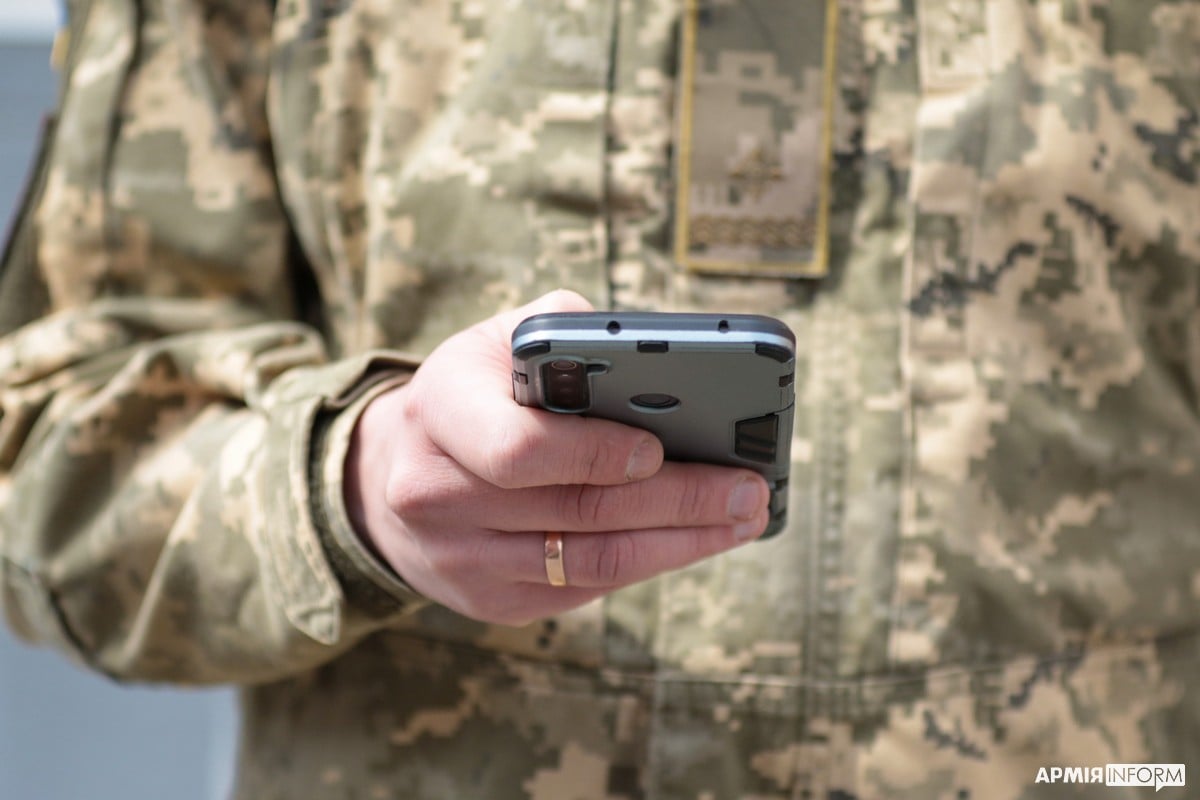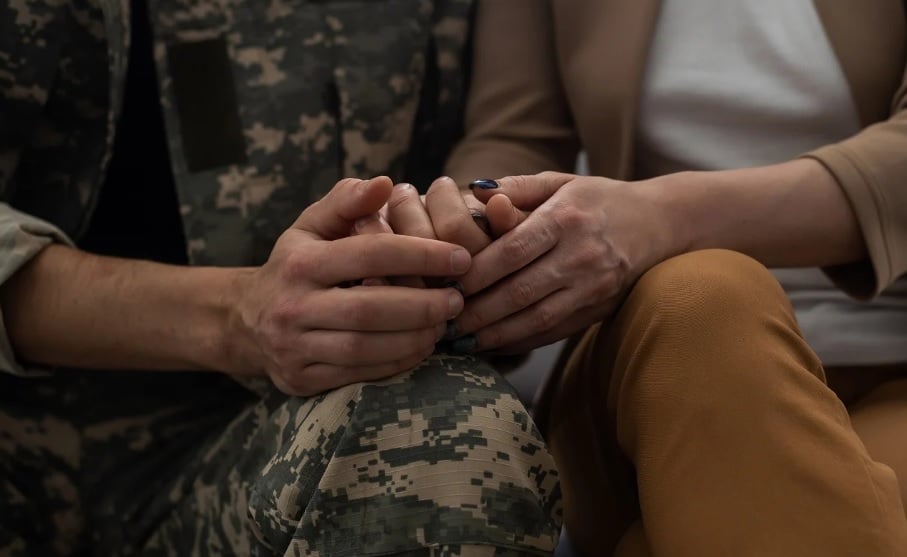
What is the problem?
War affects every part of life, including relationships—and Ukrainians, unfortunately, know this all too well. Many couples have been separated by active service, evacuation abroad, or relocation within Ukraine. As a result, Ukrainians have gained valuable experience in maintaining long-distance relationships and can offer advice to those facing similar challenges.
Video calls, instant messaging, and social media help bridge the gap, allowing you to stay connected, hear your loved one's voice, and see their face with a single click. But can they truly replace the warmth of a hug, the comfort of a casual touch, or the shared moments that create intimacy and closeness?
What is the solution?
On Valentine's Day, Rubryka spoke with experts—military personnel, family and clinical psychologist Tetiana Badova, and psychologist and sexologist Anna Kurochka. Together, we offer practical advice on finding new ways to stay connected, keeping emotions alive, and maintaining passion in long-distance relationships.
How does it work?
Step one: trust is the foundation of everything

Military, family psychologist, sexologist Tetiana Badova. Photo courtesy of the expert's archive
Despite the urgency of the issue, psychologists note that direct requests for support in maintaining sexual intimacy at a distance are relatively rare in sexology practice. "Instead, people more often struggle with their partner's emotional distance, feelings of misunderstanding, and isolation," says psychologist and sexologist Tetiana Badova.
Of course, these challenges are deeply interconnected.

Psychologist and sexologist Anna Kurochka. Photo courtesy of the expert's archive
Psychologist and sexologist Anna Kurochka shares an example (all names in this publication have been changed):
Natalia and her two children are abroad, while her husband, Pavlo, is on the front lines. The intimate aspect of their relationship has faded. Natalia hesitates to express her needs, thinking, "He already has enough on his plate." Meanwhile, Pavlo worries that she might find someone else.
"In therapy, we discussed the importance of maintaining sexual connection, even from a distance. The couple began to communicate more openly about their desires, using audio messages and video calls for intimate moments, and even considering sex toys as an option," says Kurochka.
Another case: Iryna and Oleksii. He is at war, she is abroad with their children. Overwhelmed by daily struggles, Iryna writes to him less often. Oleksii starts to think, "She must be pulling away, building a new life without me."
"In reality, she was simply afraid of burdening him with her problems," Kurochka explains. With the psychologist's guidance, the couple addressed their fears and agreed to communicate openly about their emotions. They also introduced a daily 'ritual of intimacy'—a 10-minute conversation every day, even if it's as simple as saying, 'I'm exhausted, but I want you to know that I love you.'"
How to Build Trust:
- Communicate openly – Say things like: "I'm sad," "I'm worried," "I'm afraid."
- Ask directly – If something is bothering you, talk about it instead of imagining worst-case scenarios.
- Share your daily experiences – This isn't about control, but about providing mutual support.
Step Two: Express your desires, emotions, and needs honestly

Long-distance sex should be discussed in advance. Photo: istockphoto
Sexual and emotional intimacy over distance relies on several key factors:
- Both partners must recognize the importance of staying connected and be willing to invest in it.
- Even with busy schedules, make time for communication.
- Be open about your needs, desires, and fantasies.
- Since there's no physical contact at a distance, the ability to communicate openly about intimate topics becomes essential—only verbal expressions of feelings and desires remain.
How to maintain emotional intimacy:
- Share even the smallest details—it helps create a sense of presence in each other's lives.
- Talk about the future, even when it feels uncertain.
- If your partner is silent, ask: "What can I do to make it easier for you to talk?"
Experts emphasize that the topic of sex within a relationship, especially when partners are far apart, should be discussed in advance.
Each couple is unique, and there's no universal formula that works for everyone. It's important not to follow rigid rules, but to find a communication style that feels comfortable for both partners.
If the couple already has established intimate rituals—such as sexting, flirting in messages, or open conversations about desires—it's best to continue those. These routines help maintain intimacy and foster a sense of mutual involvement. Adding lightness, humor, and setting specific times or days for these "long-distance games" can also be helpful.
If such rituals haven't been established, it's important to have an honest conversation about your needs and expectations.
Each partner should be able to answer these questions openly:
- What do I miss when you're not around?
- What's important to me in our intimate connection, even from a distance?
- What ways of maintaining sexual intimacy could feel comfortable for both of us?
The key is to approach these conversations with trust, understanding, and respect for each other's feelings, without any pressure.
"For example, in my own relationship with my husband (he's a soldier), we try to find time to talk every night. During the day, we send jokes, memes, or flirtatious messages. It's a kind of 'emotional heating' that helps us stay connected and creates a special intimate space between us, filled with lightness, trust, and playfulness," says Badova.
The psychologist also notes that maintaining this kind of connection often depends more on the partner who is not on the front lines, often the woman. Through communication, they help their partners "escape" from the harsh realities of war or stress, allowing them to feel not only as soldiers or professionals but also as loving, valued partners.
Rituals to stay connected:
- Set specific times for calls or messages – Consistency helps maintain a sense of connection.
- Send memes or joke messages – This creates a shared "information space" that strengthens your bond.
- Use "code words" or special phrases – These private expressions help maintain a sense of intimacy and uniqueness.
- Keep a joint diary or correspondence – Write down thoughts in a shared file or note, fostering ongoing dialogue.
- Embrace lightness and playfulness – Don't treat intimacy as a duty; it should be a fun and enjoyable aspect of your relationship.
"It's an extremely important task to create a 'bubble' where you can immerse yourselves in your world of intimacy together and let the rest of the world wait," says Badova.
Step three: technologies and approaches

A soldier with a phone. Illustrative photo
"A person is not just one role—a soldier or a partner waiting. Each of us is a partner, a friend, a father or mother, a professional, and also a lover. For psychological well-being, it's crucial not to get stuck in only one role, but to grow in all aspects of life," continues Badova.
How to keep the role of a lover in mind?
How can you maintain an intimate connection from a distance?
Fortunately, there are many "tools" to preserve sexuality:
- The body – It responds to touch, caresses, and sensations.
- Fantasy – It can ignite passion even without physical contact.
- Voice – Timbre, intonation, and whispers can be just as arousing as touch.
- Memory – Fond memories of past intimacy can evoke powerful emotional experiences.
- Intimacy isn't only about sex—it's about emotional connection, feelings, attention, and playfulness.
Technologies and techniques that can help maintain intimacy:
- Video Calls – Even brief visual communication can create a sense of presence.
- Voice Messages – A slow, gentle voice sharing desires or offering warm words of support can become an important "anchor" of intimacy.
- Sexting – Messages with erotic undertones, descriptions of fantasies, and light flirting.
- Smart Sex Toys – Devices that can be controlled through apps, allowing one partner to control the device from a distance (e.g., We-Vibe, Lovense).
- Photos with Hints – Sexologists recommend using not just explicit pictures but also teasing images—such as a leg in stockings, a bare collarbone, or a strap slipping off. These can be just as exciting as full exposure.
- Open Conversations about Desires – Discussing your intimate needs and fantasies openly.
- Exploring New Forms of Intimacy – Joint masturbation, using intimate toys, and developing rituals of tenderness.
❗ Important: Be cautious with explicit content, as phones can be lost or damaged. Sometimes, a subtle hint is more effective than complete openness.
What if one of the partners is in the military?
Often, men on the front lines distance themselves not because they don't care, but because they don't want to burden their partner with their pain. However, women may interpret this as coldness and emotional detachment. It's also important to remember that intimate communication is extremely limited on the front line—there is no privacy, no time, and sometimes even no desire, as the body is constantly in a state of mobilization. Reproductive functions may often be "shut down" as a survival mechanism, but when there is a moment of security, the desire can return.
Key points to keep in mind:
- Create opportunities for privacy – Badova's clients have shared that even in the toughest environments, it's possible to find a place—a forest, a landing, or even a trench—to listen to a voice message or text a loved one.
- Don't view reduced desire as a problem – This is a natural reaction that fades when the individual returns to a calmer, safer environment.
- Allow yourself to enjoy yourself – If intimate contact isn't possible, erotic fantasies, fond memories of intimacy, tactile practices (like yoga or massage), and anything else that brings relaxation and pleasure can help.
- Self-pleasure is normal – It helps reduce stress, improves sleep, and maintains hormonal balance. It should not be devalued—self-pleasure is an important part of healthy sexuality.
Will it definitely work?

At a distance, anxiety and jealousy become more acute. Photo credit: istockphoto
Distance is a challenge, but not a sentence. If a couple maintains communication and a shared emotional space, their relationship can grow even stronger.
This brings us back to trust, as anxiety and jealousy often intensify when partners are apart. Kurochka shares a case from her practice: Volodymyr is at the frontline, and his wife Olena is in Ukraine. She started attending courses and communicating more with others. Volodymyr reacted with: "Are you replacing me?"
Through therapy, it became clear that his response wasn't anger, but fear—that his wife would adjust to life without him. Olena, in turn, felt guilty for wanting to live her own life. After working through these emotions, they were able to support each other rather than retreat into their own fears.
How to deal with feelings:
- Don't blame, ask questions.
Instead of asking "Are you indifferent to me?", say "I feel that you are distancing yourself. What's going on?" - Clarify your fears.
For example, if your partner has become less available, say: "It's important for me to understand what's going on because I'm starting to worry." - Talk about yourself.
Instead of saying "You're cheating on me!", say "I'm afraid we're growing apart, and I want more contact." - Look for solutions together.
If jealousy or fear arises, instead of conflict, ask: "What can we do to make us both feel better?"
Lack of physical contact—hugs, kisses, touching—can cause strong emotions like loneliness, sadness, irritation, or even anger. In psychology, this is referred to as frustration, where desires or needs can't be met due to external circumstances. When partners are separated for extended periods, they may unknowingly accumulate negative feelings, which can then be directed at each other.
"We can't direct our frustrations at the war, but we can at our partner, which sometimes leads to conflicts or even breakups. That's why it's important to recognize your emotions and handle them properly," adds Badova.
How to stay close?
Badova shares a personal experience:
"Before Russia's full-scale invasion, when my husband fought in the east of Ukraine, I made many mistakes. I thought I shouldn't distract him with questions about everyday life, difficulties, or raising our child. I didn't have time for deep conversations—I felt I had to be strong, cope with everything on my own, and not involve my husband in life on 'peaceful territory.' At that time, I was raising a child with ASD, running a business, and getting a second degree, thinking of myself as a 'smart girl.' But as a result, we gradually drifted apart."
The psychologist explains that when her husband returned, it was difficult to reconnect, and her body was "unaccustomed" to his presence. The couple had to spend a lot of time re-synchronizing, only for him to leave again for another rotation.
With experience from the full-scale war, Badova approached things differently the second time:
- I involve my husband, even from a distance, in decision-making about everyday matters and raising our child. I share his successes and challenges. This helps him feel that he is still part of the family, not just an outsider.
- We discuss the family budget, plan vacations, and think about the future after the war. This gives us a sense of perspective and a shared path.
- We exchange jokes, funny videos, and memes to keep things light.
- Every evening, we talk on the phone, and I keep him updated on what's happening in society and politics. This keeps him connected to the outside world and helps him remain part of civilian life.
- Thanks to this, when we have brief meetings, they don't need to re-synchronize—we are already involved in each other's lives.
If you manage to create an "intimate bubble"—where there's room for trust, ease, and shared experiences—feelings of jealousy, betrayal, or distrust will not arise. The main thing is to avoid distancing. While war changes a person, you can help your partner remain an integral part of your life, not an outsider.
Even more useful solutions!
Seeking help is a way to find a solution, not a sign of failure

Illustrative photo.
Military wives often share with psychologists that after their husbands leave, they cry for several days and struggle to return to normal life. In psychological terms, this may indicate abandonment trauma, often stemming from childhood. Each new separation can become a retraumatization, making the person feel as though they are reliving the moment of abandonment. The partner left behind may feel guilty too, as they recognize that their departure causes their loved one distress. This can pose significant challenges within the relationship, making it essential to seek psychological support in a timely manner.
Remember: Your reactions to abnormal circumstances are simply a normal psychological response to extraordinary events. Don't be afraid to seek help—asking for support and utilizing psychological tools can be crucial in maintaining both your well-being and your relationship during these difficult times.
If you notice that a distance has formed between you, if conflicts have become constant, or if trust and intimacy seem irreparable, this doesn't mean your relationship is doomed. It simply means that you need support.
There are numerous resources available today offering free or affordable psychological assistance, including hubs, support groups, and charitable foundations dedicated to helping both civilian partners and the military. It's important to remember: you don't have to go through these challenges alone. Seeking support is not only acceptable, but it's also essential.
Rubryka already shared some tools that might help overcome distance and become closer even when kilometers separate you from your loved ones.








